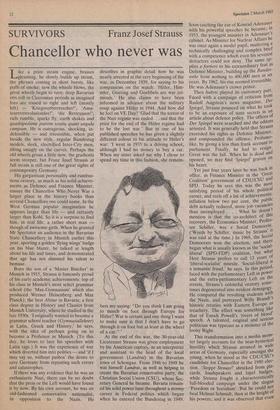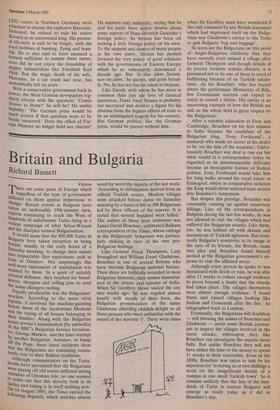Chancellor who never was
Like a prize steam engine, brasses gleaming, he slowly builds up steam, the phrases coming in short bursts, like puffs of smoke; now the whistle blows, the great wheels begin to turn; deep Bavarian rrrs roll in Ciceronian periods as imagined foes are tossed to right and left (mostly left) — `Kriegsverbrrarecher!', `Ama- teurrrrrevolutionarer, 'die Rrrrrussen!'; rails rumble, sparks fly, earth shakes and quadripedante putrem sonitu quatit ungula campum. He is outrageous, shocking, in- defensible — and irresistible, when put beside the new style, regular Bundestag models, sleek, electrified Inter-City men, tilting smugly on the curves. Perhaps the old wheels groan a little now, the gradients seem steeper, but Franz Josef Strauss at full steam is still one of the great sights of contemporary Germany.
His gargantuan personality and rumbus- tious oratory, as much as his solid achieve- ments as Defence and Finance Minister, ensure the Chancellor Who Never Was a larger place in the history books than several Chancellors one could name. In the West German popular imagination he appears larger than life — and certainly larger than Kohl. So it is a surprise to find him, in real life, a rather short man — though of awesome girth. When he granted Mr Spectator an audience in the Bavarian State Chancellery in Munich earlier this year, sporting a golden 'flying wings' badge on his blue blazer, he talked at length about his life and times, and demonstrated that age has not dimmed his talent to bemuse.
Born the son of a 'Master Butcher' in Munich in 1915, Strauss is famously proud of his early academic achievements: top of his class in Munich's most select grammar school (the 'Max-Gymnasium' which also produced Werner Heisenberg and Max Planck); the best Abitur in Bavaria; a first class degree in History and Classics from Munich University, where he studied in the late 1930s. 'I originally wanted to become a grammar school teacher (Gymnasiallehrer) in Latin, Greek and 'History,' he says, with the idea of perhaps going on to become a Professor in Munich. (To this day, he loves to lace his speeches with Latin tags.) It was the experience of war which diverted him into politics — and 'if I may say so, without pathos' the desire to save Germany from repeating such errors and catastrophes.
If there was any evidence that he was an enthusiastic Nazi, there can be no doubt that the press or the Left would have found it by now. By his own account, he was an old-fashioned conservative nationalist, in opposition to the Nazis. He describes in graphic detail how he was nearly arrested at the very beginning of the war, in December 1939, for saying to his companions on the watch: 'Hitler, Him- mler, Goering and Goebbels are war cri- minals.' He also claims to have been informed in advance about the military coup against Hitler in 1944. Arid how did he feel on VE Day? 'Glad that the terror of the Nazi regime was ended. . . sad that the price for the end of the Hitler regime had to be the lost war.' But in one of his published speeches he has given a slightly different colour to his attitude to Hitler's war: 'I went in 1935 to a driving school, although I had no money to buy a car. When my sister asked me why I chose to spend my time in this fashion, she remem- bers my saying: "Do you think I am going to march on foot through Europe for Hitler? War is certain and one thing I want to make sure is that I don't have to go through it on foot but at least at the wheel of a car."' At the end of the war, the 30-year-old Lieutenant Strauss was given employment by his American captors, as an interpreter and assistant to the head of the local government (Landrat) in the Bavarian town of Schongau. From 1946 to 1949 he was himself Landrat, as well as helping to create the Bavarian conservative party, the Christian Social Union (CSU), whose Sec- retary General he became. Bavaria remain- ed his solid power base throughout a stormy career in Federal politics which began when he entered the Bundestag in 1949. • Soon catching the ear of Konrad Adenauer with his powerful speeches he became, in 1953, the youngest minister in Adenauer s cabinet. As Minister for Nuclear Affairs he was once again a model pupil, matering a technically challenging and complex brief with a competence which even his severest detractors could not deny. The same ap- plies a fortiori to his extraordinary feat as Defence Minister, building up the Bundes.- wehr from nothing to 400,000 men in six years. By 1962, his rise seemed irresistible. He was Adenauer's crown prince. Then hubris played its customary part. Faced with a campaign of criticism from Rudolf Augstein's news magazine, Der Spiegel, Strauss pounced on what he took to be an exposure of state secrets in an article about defence policy. The offices of Der Spiegel were searched and the editors arrested. It was generally held that Strauss exceeded his rights as Defence Minister, and compounded the offence, Profumo- like, by giving a less than frank account to parliament. Finally, he had to resign - Great was the fall. When he is dead and opened, we may find 'Spiegel' graven on his heart. Yet just four years later he was back in office, as Finance Minister in the 'Great Coalition' government of CDU/CSIJ and SPD. Today he says this was the most satisfying period of his whole political career, and reels off a list of achievements.: inflation below two per cent, the public debt actually reduced, more job vacancie,s than unemployed . . . . What he doesn.t mention is that the co-architect of this recovery, the Economics Minister, Profes- sor Schiller, was a Social Democrat.. (Words by Schiller, music by Strauss'. it was said at the time.) In 1969, the Social Democrats won the election, and there began what is usually known as the 'social- liberal' (SPD-FDP) coalition, but what Herr Strauss prefers to call 13 years of 'liberal-socialist' misrule. 'Social-liberal is a semantic fraud,' he says. In this period, faced with the parliamentary Left in power and the extra-parliamentary Left on the streets, Strauss's colourful oratory some- times degenerated into strident demagogY. He compared the revolting students with the Nazis, and portrayed Willy Brandt 'S historic treaties with Eastern Europe as treachery. The effect was something like, that of Enoch Powell's 'rivers of blood speech. A talented, original and serious politician was typecast as a monster of the loony Right.
This transformation into a media mons- ter largely accounts for the near-hysteneal hostility which Strauss aroused in wide areas of Germany, especially amongst the young, when he stood as the CDU/CSU's candidate for Chancellor in the 1980 elec- tion. `Stoppt Strauss!' shrieked from pla- cards, loudspeakers and lapel badges, while Strauss fought a characteristically full-blooded campaign under the slogan 'Freedom or Socialism'. But he could not beat Helmut Schmidt, then at the height of his powers; and it was observed that even
CDU voters in Northern Germany were reluctant to choose the explosive Bavarian. Defeated, he retired to rule his native Bavaria as its uncrowned king. His person- al life-style is said to be kingly, with the royal hobbies of hunting, flying and feast- ing. He is also said to have amassed a fortune sufficient to sustain these tastes, even did he not enjoy the friendship of mighty industrialists like Friedrich Karl Flick. But the tragic death of his wife, Marianne, in a car crash last year, has undoubtedly left its scars.
With a conservative government back in Power, the West German newspapers reg- ularly vibrate with the question: 'Comes Strauss to Bonn?' So will he? He smiles impishly: The German press would be 'fluch poorer if that question were to be finally answered.' Does the office of For- eign Minister no longer hold any charms? He answers only indirectly, saying that he and his party have major doubts about some aspects of Hans-Dietrich Genscher's foreign policy. So Strauss has been off making a little foreign policy on his own. To the surprise and dismay of many people in his own party, Strauss has pushed forward the very policy of good relations with the governments of Eastern Europe which he so vehemently denounced a decade ago. But 'Si duo idem faciunt, non est idem,' he quotes, and grins broad- ly. No, he has not lost his talent to bemuse.
Like Enoch, with whom he has more in common than just the love of classical quotation, Franz Josef Strauss is probably too mercurial and divisive a figure for his absence from the highest offices of state to be an unmitigated tragedy for his country. But German politics, like the German press, would be poorer without him.















































 Previous page
Previous page